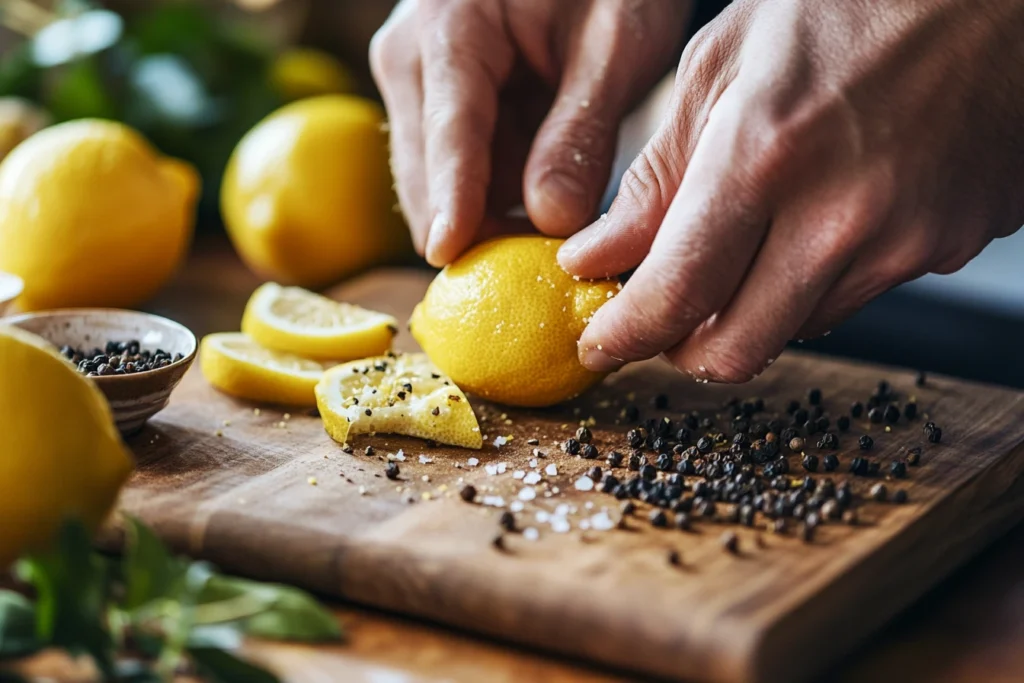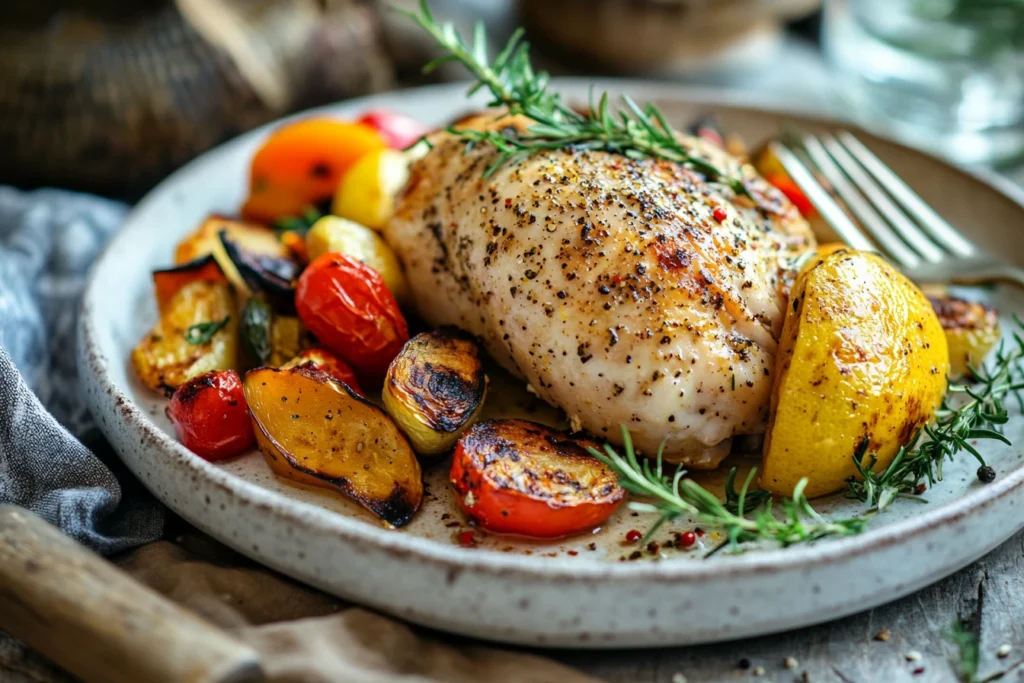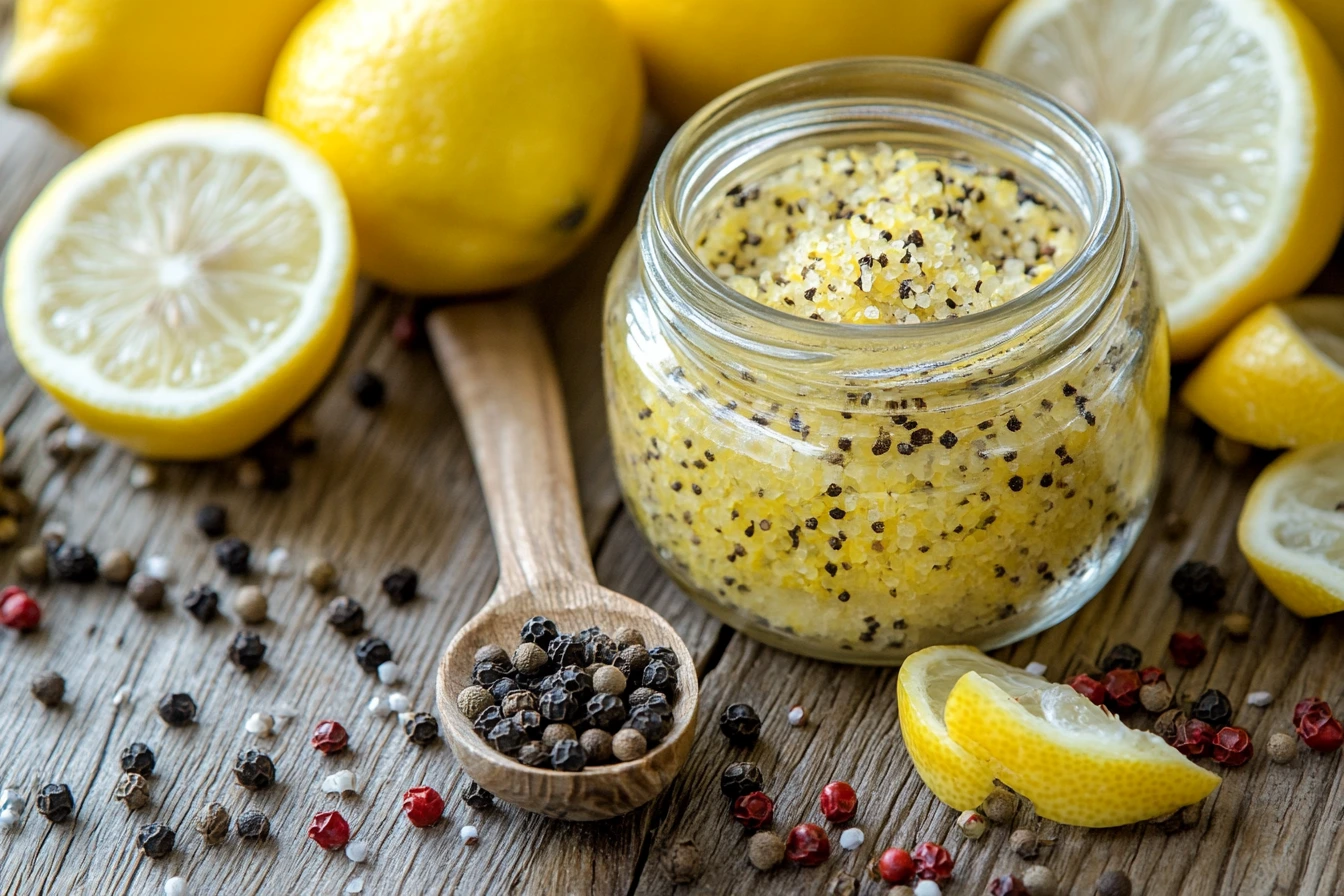If you’ve ever craved that zesty, tangy, and peppery kick in your dishes, then you’re in the right place! Lemon pepper seasoning is a classic spice blend that enhances everything from chicken to seafood, vegetables, and even snacks like popcorn. While store-bought versions are convenient, making your own homemade lemon pepper seasoning recipe allows you to control the flavors, avoid preservatives, and customize it to your taste.
In this guide, we’ll cover everything you need to know about this versatile spice mix. From its history and key ingredients to an easy-to-follow lemon pepper seasoning recipe, plus variations and storage tips. Whether you’re a home cook or a seasoned chef, this article will help you master the art of making your own citrus spice blend. Let’s dive in!
Table of Contents
What is Lemon Pepper Seasoning Recipe?
History and Origin of Lemon Pepper
Lemon pepper seasoning has been a staple in kitchens for decades, but its origins are a bit of a mystery. Some say it was inspired by Mediterranean cuisine, where citrus and pepper were commonly used to season meats and fish. Others believe it gained popularity in American kitchens, particularly in Southern and Cajun cooking. Regardless of its roots, this zesty spice blend has become a household favorite worldwide.
Common Uses in Cooking
One of the best things about lemon pepper seasoning recipe is its versatility. It’s a go-to for:
- Chicken and seafood – The citrusy notes complement poultry and fish beautifully.
- Vegetables – Sprinkle it on roasted or sautéed veggies for extra flavor.
- Popcorn and snacks – A quick way to add a punch to chips, fries, and even nuts.
- Pasta and rice dishes – Mix it into butter or olive oil for a deliciously simple sauce.
Why Make It at Home Instead of Buying?
Sure, grabbing a bottle off the grocery shelf is easy, but homemade is so much better. Here’s why:
✔ No preservatives or artificial flavors – Store-bought versions often contain unnecessary additives.
✔ Customizable – Want it spicier? Less salty? More garlicky? You control the ingredients.
✔ Fresher and more aromatic – Freshly dried lemon zest and crushed black pepper make all the difference.
✔ Cost-effective – Buying whole ingredients in bulk saves money in the long run.
Making homemade lemon pepper seasoning is simple, fun, and incredibly rewarding. In the next section, we’ll break down the essential ingredients and how to choose the best ones for maximum flavor. Stay tuned! 🚀
Ingredients for Homemade Lemon Pepper Seasoning Recipe
Core Ingredients and Their Roles
Making your own lemon pepper seasoning recipe is easier than you might think! The key to a flavorful blend is using high-quality ingredients. Here’s what you need:
- Lemon zest – The star ingredient, providing the tangy citrus punch.
- Black pepper – Adds a warm, sharp bite that balances the acidity.
- Salt – Enhances flavors and helps preserve the seasoning.
These three ingredients form the base, but adding a few extras can take your blend to the next level.
Choosing the Best Lemons and Pepper for Maximum Flavor
Not all lemons are created equal. For the best homemade lemon pepper, use:
✔ Organic lemons – Since you’ll be using the zest, avoid pesticides.
✔ Bright yellow, firm lemons – These have the most flavorful oils.
When it comes to black pepper, freshly ground peppercorns work best. The larger the grind, the more intense the heat, so adjust based on your taste preference.
Optional Additives for Custom Flavors (Garlic, Herbs, etc.)
Want to make your lemon pepper seasoning recipe unique? Try these additions:
- Garlic powder – Gives an extra depth of flavor.
- Onion powder – Complements the citrusy notes beautifully.
- Thyme or parsley – Adds an herby touch.
- Cayenne pepper – For a spicy kick.
Now that we’ve got the ingredients sorted, let’s dive into how to make this seasoning step by step!
Step-by-Step Lemon Pepper Seasoning Recipe

Step 1: Prepping the Lemons (Zesting and Drying)
To get started, wash and dry 4-5 organic lemons thoroughly. Using a microplane or zester, grate only the yellow outer layer of the skin avoiding the white pith, which can be bitter.
How to Dry Lemon Zest:
- Spread the zest evenly on a baking sheet.
- Dry it at lowest oven temperature (around 170°F/75°C) for 1-2 hours OR air-dry it overnight.
- Once crisp, it’s ready for blending!
Step 2: Grinding and Blending the Spices
Now, it’s time to mix the seasoning:
- In a spice grinder or mortar and pestle, grind 2 tbsp black peppercorns to your preferred texture.
- Combine with ¼ cup dried lemon zest and 1 tbsp kosher salt.
- For a smoother blend, pulse in a food processor for a few seconds.
Step 3: Storing for Freshness and Longevity
Proper storage is key to maintaining freshness:
✔ Use an airtight glass jar – Plastic can absorb and alter flavors.
✔ Store in a cool, dry place – Avoid moisture to prevent clumping.
✔ Label with a date – Homemade spice blends stay fresh for 6 months.
Step 4: How to Adjust the Recipe for Different Tastes
- Love it zesty? Add extra lemon zest.
- Prefer it milder? Use less black pepper.
- Want a smoky flavor? Try smoked black pepper.
Now that you have your very own homemade lemon pepper seasoning recipe, get ready to use it in your favorite dishes! Next, we’ll explore different ways to customize the recipe and fun variations to try.
Variations and Substitutes for Lemon Pepper Seasoning Recipe
Spicy Lemon Pepper: Adding Chili or Cayenne
If you love a bit of heat in your dishes, you can easily make a spicy lemon pepper seasoning recipe by adding chili flakes or cayenne pepper. Here’s how:
- Mix ½ teaspoon of cayenne pepper or 1 teaspoon of crushed red pepper flakes into your seasoning blend.
- Taste and adjust to your desired spice level.
- This variation pairs wonderfully with grilled meats, roasted vegetables, and seafood.
Low-Sodium or Salt-Free Version
Trying to cut back on salt? No problem! Here’s how to make a low-sodium lemon pepper seasoning:
✔ Simply skip the salt in the recipe.
✔ Add extra dried lemon zest for a stronger citrus kick.
✔ Consider using nutritional yeast for a savory, umami-rich flavor.
This salt-free blend works great for anyone on a low-sodium diet while still keeping meals flavorful.
Citrus Alternatives: Lime, Orange, or Yuzu Pepper
Not a fan of lemons? Try experimenting with other citrus fruits!
- Lime zest – A tangy and slightly bitter twist, perfect for seafood.
- Orange zest – Sweeter and milder, great for chicken and pork dishes.
- Yuzu zest – A Japanese citrus with a floral aroma, adding complexity to your spice mix.
Vegan and Organic Variations
To keep your lemon pepper seasoning recipe as natural as possible:
✔ Use organic lemons and black peppercorns to avoid pesticides.
✔ Choose unrefined sea salt or Himalayan pink salt for added minerals.
✔ Store in a glass jar to maintain freshness and prevent contamination from plastics.
No matter how you customize it, homemade lemon pepper seasoning is a game-changer in the kitchen! Next, let’s explore the best ways to use this flavorful blend.
Best Dishes to Use with Lemon Pepper Seasoning Recipe

Classic Uses: Chicken, Fish, and Vegetables
One of the best things about a lemon pepper seasoning recipe is its versatility. Here are some traditional ways to use it:
- Chicken – Season chicken breasts, wings, or thighs before baking or grilling.
- Fish – Sprinkle on salmon, tilapia, or shrimp for a bright, zesty flavor.
- Vegetables – Toss with roasted potatoes, asparagus, or green beans.
Creative Recipes: Popcorn, Fries, and Pasta
Want to get creative? Try these unique ways to use lemon pepper seasoning recipe:
- Popcorn – Swap out butter for a sprinkle of lemon pepper for a bold snack.
- French fries – Ditch the regular salt and use lemon pepper for a gourmet twist.
- Pasta – Mix into olive oil or butter for a quick and delicious pasta sauce.
How Restaurants Use Lemon Pepper in Signature Dishes
Many restaurants and chefs use lemon pepper seasoning in signature dishes. It’s often found in:
✔ Wing sauces – Atlanta is famous for its lemon pepper wings!
✔ Seafood platters – Enhancing the freshness of shrimp, crab, and lobster.
✔ Gourmet burgers – Adding a citrusy kick to beef or turkey patties.
With so many possibilities, this seasoning is a must-have in any spice collection. Next up, we’ll cover how to store it properly for long-lasting freshness!
Storing and Shelf Life of Homemade Lemon Pepper Seasoning Recipe
Best Storage Practices (Jars, Airtight Containers, etc.)
To keep your homemade lemon pepper seasoning fresh and flavorful, proper storage is key. Here’s what you need to do:
✔ Use an airtight container – A glass jar with a tight seal is ideal to lock in the aroma.
✔ Keep it away from heat and moisture – Store in a cool, dry place like a pantry, away from the stove.
✔ Avoid plastic containers – Glass is better because it won’t absorb or alter the flavors.
If stored correctly, your lemon pepper seasoning recipe will stay fresh and potent for months!
How Long Does Homemade Lemon Pepper Last?
Unlike store-bought versions filled with preservatives, homemade lemon pepper seasoning has a shelf life of about 6 months. Over time, the lemon zest may lose its punch, and the pepper can become less aromatic.
Tips for Extending Freshness:
- Keep it in a dark place – Exposure to light can break down essential oils in the zest.
- Use silica gel packs – These absorb excess moisture and prevent clumping.
- Make smaller batches – Freshly made seasoning always has the best flavor.
Signs of Spoilage and How to Keep It Fresh Longer
Not sure if your seasoning is still good? Here’s how to tell:
❌ Weak aroma – If it no longer smells citrusy or peppery, it’s time for a fresh batch.
❌ Clumping – Moisture can cause the seasoning to stick together, making it less effective.
❌ Dull color – Faded yellow zest means the seasoning has lost its vibrancy.
By following these simple storage tips, your lemon pepper seasoning recipe will stay fresh and flavorful for months to come!
Frequently Asked Questions (FAQ)
What is Lemon Pepper Seasoning Made Of?
Lemon pepper seasoning is a simple yet flavorful blend of dried lemon zest, black pepper, and salt. Many homemade recipes also include garlic powder, onion powder, and dried herbs for extra depth.
What is a Substitute for Lemon Pepper Seasoning?
If you run out of lemon pepper seasoning, don’t worry! Here are some quick substitutes:
- Lemon zest + black pepper + salt – The closest alternative to the original blend.
- Lemon juice + cracked pepper – Works for marinades and wet rubs.
- Cajun seasoning + lemon zest – For a spicy twist with citrus flavor.
What Are the Ingredients in McCormick Lemon Pepper Seasoning?
McCormick’s version contains:
- Salt
- Black pepper
- Citric acid
- Garlic
- Onion
- Sugar
- Natural flavors
It’s a bit different from a homemade lemon pepper seasoning recipe, which skips artificial flavors and preservatives.
What Are the Ingredients in Tone’s Lemon Pepper Seasoning?
Tone’s lemon pepper seasoning includes:
- Salt
- Black pepper
- Lemon peel
- Sugar
- Citric acid
- Garlic and onion powder
While convenient, store-bought blends often contain extra additives. Making it at home ensures a fresher, healthier alternative!
With this guide, you now have everything you need to make, store, and use your own lemon pepper seasoning recipe. Time to start cooking! 🍋🔥
Health Benefits of Lemon Pepper Seasoning
Rich in Antioxidants and Vitamins
One of the best things about making your own lemon pepper seasoning recipe is that it’s packed with natural ingredients that offer health benefits.
- Lemon zest is rich in vitamin C, which helps boost immunity and fight off colds.
- Black pepper contains piperine, an antioxidant that may improve digestion and metabolism.
- Garlic and onion powder (if added) offer antibacterial properties that support overall health.
Unlike processed seasonings, a homemade blend skips preservatives and artificial additives, making it a cleaner, healthier option.
Low in Calories, High in Flavor
If you’re watching your diet, lemon pepper seasoning is a great way to add flavor without extra calories.
✔ Zero fat, zero carbs – It enhances food without unwanted extras.
✔ Naturally low in sodium – By making it yourself, you can control the salt content.
✔ Boosts metabolism – Black pepper is known to help with digestion and may aid in weight management.
Great for Heart Health
A homemade lemon pepper seasoning recipe can be beneficial for heart health.
- Lemon’s flavonoids may help reduce inflammation.
- Black pepper’s antioxidants can support circulation and blood vessel health.
- A low-sodium version can help maintain healthy blood pressure.
Using this seasoning in place of high-sodium blends can help reduce your risk of hypertension and heart disease.
By making it at home, you ensure that you’re using fresh, high-quality ingredients that contribute to a healthier lifestyle!
Homemade vs. Store-Bought – Which One is Better?
Taste and Freshness: Homemade Wins!
When it comes to flavor, homemade lemon pepper seasoning is far superior to store-bought options.
✔ Freshly dried lemon zest has a bright, zesty aroma that bottled versions often lack.
✔ No preservatives mean you get pure, unaltered flavor.
✔ Customizable – You can tweak the ingredients to your taste, whether that means adding garlic, reducing salt, or increasing the heat.
Ingredients and Additives: The Clean Option
Most commercial lemon pepper seasoning brands include additives like citric acid, artificial flavors, and anti-caking agents. While these extend shelf life, they don’t offer the same fresh, natural taste.
Homemade seasoning, on the other hand:
✔ Uses only natural ingredients
✔ Has no unnecessary fillers
✔ Lets you control the salt and spice levels
If you’re looking for a clean-eating option, making it at home is the way to go!
Cost and Convenience: Which One is More Practical?
Store-bought lemon pepper seasoning is convenient, but is it worth the cost?
- A single bottle can cost anywhere from $3 to $6, while making it at home is much cheaper in the long run.
- You likely already have black pepper and salt in your pantry so all you need is fresh lemon zest.
- While store-bought versions save time, making it yourself only takes a few minutes and delivers far better results.
Final Verdict: Homemade is the Winner
If you care about freshness, flavor, and clean ingredients, homemade lemon pepper seasoning is the clear winner. It’s easy to make, healthier, and more customizable. Plus, once you try the homemade version, you’ll never go back to store-bought!
If you love flavorful homemade seasonings, you might also enjoy trying this Homemade Hot Sauce Recipe for an extra kick of spice in your dishes

